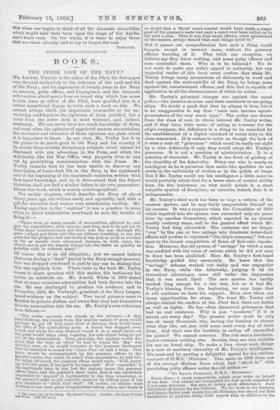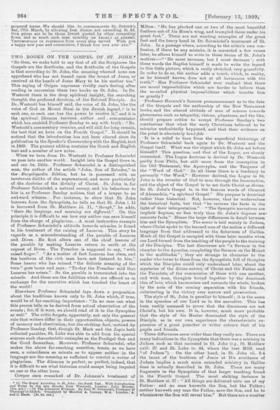BOOKS.
THE INNER LIFE OF THE NAV Y.* Mat. LIONEL YEELEY is the editor of the Fleet, the first papaw ever devoted exclusively to the interests of the rank-and-file of the Navy ; and his experience of twenty years in the Navy as seaman, petty officer, and Coastguard, and the intimate information about men's lives on board ship which has come to him since as editor of the Fleet, have qualified him in a rather exceptional degree to write such a book 'as this. We cannot always think his arguments reasonable or his un- wavering confidence in the rightness of them justified, but a voice from the lower deck is most welcome, and, indeed, necessary. We can never have too much knowledge of facts, and even when the opinions of aggrieved seamen are mistaken, the existence and character of those opinions are facts which it is important to know. In our view, Mr. Yexley has it in file power to do much good to the Navy and his country if be avoids those strictly disciplinary subjects which cannot be discussed with any advantage in the Press, and which the Admiralty, like the War Office, very properly tries to rule out by prohibiting communication with the Press. Mr. Yexley remarks that ho has been unable to discover any description of lower-deck life in the Navy in the eighteenth and at the beginning of the nineteenth centuries written with first-hand knowledge, and ho is determined that the future historian shall not find a similar defect in his own generation. Hence this book, which is mainly autobiographical. • .
The earlier chapters, which describe the Navy of about thirty years ago, are written easily and agreeably, and with a gift for narrative that makes very entertaining reading. Mr. Yexley says that in the "eighties" it was a practice in some ships to throw ammunition overboard to save the trouble of firing it :— " There were so many rounds of ammunition allowed to each gun for expenditure each quarter, and they had to be got rid of. Some ships conscientiously put them into the sea—through the guns—others put them into the sea without troubling to use the guns for the purpose, and one method was just as good as another ES far as results wore concerned, because, in both cases, the object was to get the beastly things into the water as quickly as Possible with or without mess," Of course this is an old allegation ; but we cannot believe that even during a "dead" period in the Navy enough ammuni- tion was dropped overboard to justify any one in stating that this was regularly done. Where later in the book Mr. Yexley conies to closer quarters with this matter, the testimony has rather an indefinite air. Mr. Arnold White in 1902 stated that on some occasions ammunition had been thrown into the sea. He was challenged to produce his evidence, and in December, 1902, Mr. Yerburgh, president of the Navy League, heard evidence on the subject. Two naval gunners came to London in private clothes, and swore that they had themselves thrown ammunition into the sea. Mr. Yexley's own testimony is as follows-:—.
" The modus operandi was simple in the extreme :—A ship started firing, the rounds from the heavier nature of guns would perhaps be got off with some show of decency, then would come the turn of the quick-firing guns. A barrel was dropped over- board, and while the ship steamed round it iu a small circle, all the guns would blaze away together, the sole object being to get rid of the ammunition. Then, probably, the captain would dis- cover that the tithe at which lie had to rejoin the flag' was drawing near, so he would intimate to the gunnery lieutenant that he intended to sound the Cease Piro' at such a time. This tows would be communicated by the gunnery officer to the gunner's mate, who would be asked what ammunition ho had left. On being informed, the gunnery officer -would reply, Well, hurry. up with the guns, it has got to be expended.' Now' expended' is the legitimate term to use, but the captain knew, the gunnery Officer knew, and the gunner's niate knew, that it was absolutely impossible to 'expend' it legitimately in the time remaining, so the gunner's mate would expedite matters by telling some of the gun numbers to ' ditch that stuff.' Of course, no officers were looking or saw such gross irregularities taking place, and there is • The Inner Life of the Navy. By Lionel Yexley. London i Sir Isaac Pitman and Sons. [10e. 6d. notd no doubt that a Naval court-martial would have made a scape- goat of the gunner's mate had such a court ever been called on to try such a case. Thus it was that naval officers, when questioned on the matter, always denied that such things could be."
But it passes our comprehension how such a thing could happen, except in unusual cases, without the gunnery officers knowing of it. They (with one exception, we believe) say they know nothing, and some petty officers and men contradict them. Who is to be believed P We do not want to make any unfair appeal to authority, but any impartial reader of this book must confess that while Mr. Yexley brings many accusations of dishonesty in word and deed against the rank-and-file of the Navy, he brings none against the commissioned officers, and this fact is capable of application in all the circumstances of which he writes.
Mr. Yexley's principal charges are against the naval police,—the masters-at-arms and their assistants in sea-going ships. No doubt a good deal that he alleges is true, but it is an exaggeration to say that " such men become agents- provocateurs of the very worst type." The police are drawn from the elms of men in whose interest Mr. Yexley writes,. and if they have little sense of acting as trustees for the ship's company, the deficiency is a thing to be remedied by the establishment of a higher standard of social duty in the class concerned. It is useless to write as though the lack of it were a sort of " grievance " which could be easily set right by a wise Admiralty if only they would adopt Mr. Yexley's panaceas. It is not a question of administration. It is a question of character. Mr. Yexley ie too fond of girding at the stupidity of the Admiralty. Every one who is nearly as intelligent as he is perceives that sailor-like qualities do not reside in the uniformity of clothes or in the polish of brass.
But if Mr. Yexley would use his intelligence a little more he would probably admit that for a lower class of mental ability than his the insistence on very small points is a most valuable symbol of discipline ; so valuable, indeed, that it is indispensable.
Mr. Yexley's chief work has been to urge a reform of the canteen system, and he may fairly congratulate himself on his success. It was a surprise when the Committee of 1900 which inquired into the system was succeeded only six years later by another Committee, which reported in an almost exactly contrary sense, and to the general effect which Mr. Yexley had long advocated. The canteens are no longer " run " by the one or two ratings who dominate lower-deck affairs and profess to represent " the ship's company," but are open to the honest competition of firms of first-rate reputa- tion. Moreover, the old system of " savings" by which a man was credited with the value of rations which he did not care to draw has been abolished. Here Mr. Yexley's first-hand knowledge guided him accurately. He knew that the " savings " scheme worked out badly and was unpopular in the Navy, while the Admiralty, judging it by its theoretical advantages, were still under the impression that it was much liked. The new system has hardly worked long enough for a fair test, but as it had Mr 'Yexley's blessing from the beginning, we may hope that it will continue to have his support. Even now there are many opportunities for abuse. We trust Mr. Yexley will always remind the readers of the Fleet that there are duties as well as rights. He has often discovered grievances that had no real existence. Why is jam " nauseous " if it is served out every day ? The present writer must be only one of many thousands who, having the freedom to choose what they like, eat jam with some meal every day of their lives. And what was the hardship in eating off enamelled tin plates ? We cannot conceive. The rich man's luncheon- basket contains nothing else. Besides, they are very suitable for use on board ship. To make a fuss about such things is a sort of snobbery unworthy of Mr. Yexley's intelligence. We must end by quoting a delightful appeal for the canteen contract of H.M.S. ' Hibernia.' This came in 1906 from one of the corrupt Maltese firms which had " stood in ' peculating petty officers under the old system:— " To SHIO3 COMPANY, H.M.S. 'RIBBER/A.' DEAR SIES,—I most respectfully solicit your votes on behalf of my firm. Our TERMS are unequalled for best goods supplied at 5 per cent. discount, Six men to insure good attendance. Boat furnished all knows its use fullness. We are born in the busmss, and knows bettor your wants the old Iliberme was one of our first instillation of cant eon being Irish named ship in addition to the proposed terms. We should like to commemorate St. Patrick's day, 17th March, by allowing free dinner not exceeding, 2s. ad. Ova prices are to be those lowest quoted by other competing firms, and so much each man monthly oa YEARLY As Ammer,. TEErrisioNIALs IN rosszsioa from every ship served Wish you a happy new year and commission, I thank YOU ONE AND ALL."










































 Previous page
Previous page